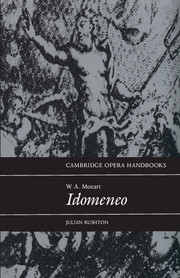Book contents
- Frontmatter
- Contents
- List of illustrations
- General preface
- Acknowledgements
- Introdution
- 1 Synopsis
- 2 Genesis of an operone
- 3 ‘Madame Dorothea Wendling is arcicontentissima’: the performers of Idomeneo
- 4 The genre of Idomeneo
- 5 From myth to libretto
- 6 Idomeneo after Mozart
- 7 General structure of Idomeneo
- 8 Two soliloquies
- 9 The musical language of Idomeneo
- 10 Tonality and motive
- 11 Elettra's first aria and the storm scene
- 12 Conclusions
- Notes
- Select bibliography
- Index
- Plate section
2 - Genesis of an operone
Published online by Cambridge University Press: 05 June 2012
- Frontmatter
- Contents
- List of illustrations
- General preface
- Acknowledgements
- Introdution
- 1 Synopsis
- 2 Genesis of an operone
- 3 ‘Madame Dorothea Wendling is arcicontentissima’: the performers of Idomeneo
- 4 The genre of Idomeneo
- 5 From myth to libretto
- 6 Idomeneo after Mozart
- 7 General structure of Idomeneo
- 8 Two soliloquies
- 9 The musical language of Idomeneo
- 10 Tonality and motive
- 11 Elettra's first aria and the storm scene
- 12 Conclusions
- Notes
- Select bibliography
- Index
- Plate section
Summary
Mozart's connections with the Munich court dated back to just before his sixth birthday, when he was taken there to be exhibited: it was his first venture as a musician, probably his first of any kind, outside his native Salzburg. He was there again the following year, at the beginning of the lengthy tour that was to take him to Paris and London, and once more, on the way back, three and a half years later. The fourth visit was in 1774-5, when his opera buff a La finta giardiniera was given at the Salvator Theatre during the carnival season; anxious to make an impression in Munich beyond the opera house, he wrote a number of liturgical works, among them a powerful Misericordias Domini (K. 222/2O5a) in a learned, contrapuntal style.
The years 1777-8 saw Mozart's crucial journey to Mannheim and Paris, seeking career opportunities away from the provincialism and pettiness of Salzburg and its court. Munich was his first important stop. In a letter home to his father (2 October 1777) he fantasised about staying there and earning a living composing operas:
I should draw up a contract with Count Seeau [intendant of the court opera] along the following lines: to compose every year four German operas, some buffe, some serie, with a benefit night, as is the custom here … with my help the German national theatre would certainly be a success. When I heard the German Singspiel I was simply itching to compose.
He added that a German serious opera was in prospect ‘and they are very anxious that I should compose it’.
- Type
- Chapter
- Information
- W. A. Mozart: Idomeneo , pp. 25 - 47Publisher: Cambridge University PressPrint publication year: 1993
- 1
- Cited by



